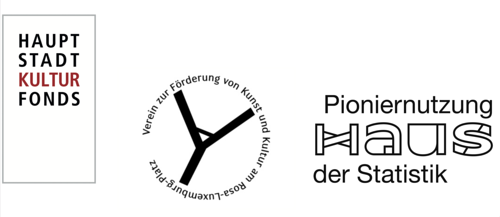Common Spaces in Transitional Societies
August 8–September 15, 2024
Opening at the Kunstverein am Rosa-Luxemburg-Platz: August 8, 7pm
Linienstraße 40, 10119 Berlin
Opening at the Haus der Statistik (OTTO-Halle): August 17, 7pm
Otto-Braun-Straße 70–72 10178 Berlin
Finissage at Kunstverein am Rosa-Luxemburg-Platz: August 31, 7pm
Finissage at Haus der Statistik (OTTO-Halle): September 15, 7pm
Curator: Dorothee Albrecht, Co-curators: Mikhail Lylov, Susanne Prinz, Advisor: Prof. Dr. Sarat Maharaj, Programme: Jochen Becker, Suza Husse & Elske Rosenfeld, Mikhail Lylov.
CLUBS of the FUTURE departs from communal spaces in different parts of the world, in particular Houses of Culture across Europe and in the GDR, and opens up a space for reflection on current projects of collectivity, commoning and reform. The project takes place in a time of transition in which practices of collaboration, alternative economies, novel networks, shared civic spaces and societies are being renegotiated and put to the test.
The project arose from research into the approximately 1,800 GDR Houses of Culture, two thirds of which were closed after reunification. This closure has created a gap that is being exploited especially by right-wing groups.
Direct references are made to historical Houses of Culture in Eastern Europe, for example in Andreas Fogarasi’s project Kultur und Freizeit on Houses of Culture and educational centres in Budapest and in Enlightenment, Culture, Leisure: Houses of Culture in Czechoslovakia by Oskar Helcel & Martin Netočný. Culture without a House—A Rose without Roots—Toward a History of Rosa’s House of Culture by Chto Delat reflects on their own project in St. Petersburg, staged from 2015–2022.
Being introduced are prototypical workshop or club formats which offer a continuing community framework for a wide range of concerns and interests:
The video work Greif zur Feder (Grab a Pen) by Ina Wudtke refers specifically to the writing circles in the Houses of Culture of the GDR. Her installation Black Lives Audio Triptych / Part III / Hilarius Gilges touches on anti-racist struggles.
In Andrea Pichl’s installation Klub Zukunft (Future Club), a standard two-room flat from the GDR’s housing series 70 is brought in relation to similar flats in New York and Dublin. Elske Rosenfeld’s wall collage In eigener Sache (On Your Own Account) is based on covers of hobby and nature magazines from the last year of the GDR.
Henrike Naumann’s performance project at a drama theatre in western Ukraine deals with the situation prevailing in a country at war. A further examination of war and catastrophe is contributed by Dana Kavelina with her video work Why There are no Monuments to Monuments.
The communal as a central theme is explicitly demonstrated in Ming Wong’s video work KONTAKTHOPE, documenting a “dance theatre” workshop with curators and artists. In her participatory research project Resonance—Post-Socialist Group Improvisation, Anna Zett developed an open play format for groups together with Hermann Heisig.
Berit Fischer’s Radical Empathy Lab is an ongoing laboratory for alternative and holistic knowledge production that embraces relational learning.
Representing our broad referential framework are projects such as Sajan Mani’s Wake-Up Calls for My Ancestors, in which he deconstructs racist practices. Another research format is the AAH Room (Apartheidera Art History Room) on Salisbury Island, Durban at the University College for Blacks of Indian Origin by Sarat Maharaj, designed by Ecke Bonk. Abrie Fourie’s installation MAPSA Bricks & Books refers directly to a venue for contemporary art in the Karoo semi-desert in South Africa.
The starting point for a feminist reading club could be the video work It grew fur again, lost it, developed scales, lost them by Gitte Villesen.
Anchored in Berlin is SATELLIT, a space conceived for art and cooking, sustainability and encounters. Similarly, the MITKUNSTZENTRALE, as part of the Haus der Statistik, is a laboratory, project space and discussion forum for pressing questions related to the future.
Particularly garden projects appear future orientated: Katya Gardea Browne’s A Floating Garden & Exchange of Seeds interweaves her artistic work with the Cuemanco Xochimilco project in Mexico. Åsa Sonjasdotter & Mercè Torres Ràfols’ The Kale Bed is so Called Because there is Always Kale in it traces the events of the Great Famine in Ireland, caused by the potato blight. Ilya Dolgov’s Compound Selves: The Cichlasoma Accident introduces an amalgamation of aquarium fish spawning dances, devastating plant infections and intuitive technologies.
The results of Jasmina Al-Qaisi’s & Mikhail Lylov’s children’s workshop Sharing Tomatoes with the Slugs remind us of experiences with a kind of informal, collective pedagogy.

